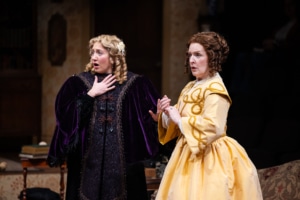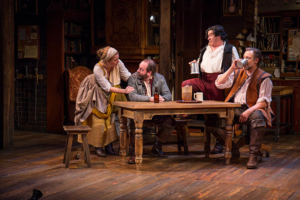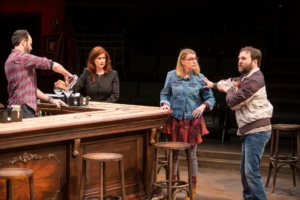DCPA NEWS CENTER
Enjoy the best stories and perspectives from the theatre world today.
Enjoy the best stories and perspectives from the theatre world today.
In the 2005 theatre season, The New York Times reported that the city’s five leading Off-Broadway theatre companies produced 27 plays and only five — or 19% — were written by women. In that same season, the Denver Center Theatre Company (DCTC) produced nine plays all of which were written by men.

Annie Abramczyk and Linda Mugleston in The Suffragette’s Murder. Photo by Jamie Kraus Photography.
In fact, in its first 25 seasons spanning 1979/80 through 2003/04, the Denver Center Theatre Company only produced 24 total plays by women — or 8% of its nearly 300 productions — even though its first play written and directed by women went on to be one of the most widely produced plays in regional theatre. In fact, the DCTC’s world premiere of Quilters was produced by 41 other professional theatres in subsequent seasons, not counting community and school productions.
But Denver was not alone in its preponderance of male playwrights and directors. Far from it. But it was the Denver Center for the Performing Arts and its Theatre Company that set out to do something about it.
Recognizing that there was an underrepresentation of female playwrights in the American theatre, the DCPA established the Women’s Voices Fund in 2005, a first-of-its-kind fund to support the work of women playwrights and directors. Originally launched in May 25 with a request for Founding Members to pay $5,000 over five years to establish a $500,000 foundation, the effort met its goal within six months as more than 100 individuals stepped forward to give voice to women.

Piter Marek and Mahira Kakkar in Inana by Michele Lowe
Now, on the cusp of its 20th anniversary, the Women’s Voices Fund is celebrating its impact on Denver and the American Theatre.
“There is nothing like this anywhere in the world,” said DCTC commissioned playwright Michele Lowe upon the productions of her plays, Inana (2009) and Map of Heaven (2011). “The Women’s Voices Fund is a miracle, a living breathing American theatre miracle.”
Over the past 20 years, the works by women playwrights on stages across America has changed dramatically. While no national reporting exists for 2005, representation was sorely lacking. Then, beginning in 2015, the Dramatists Guild of America and The Lilly Awards began a study called “The Count,” which aimed to track gender and racial representation of playwrights in American theatres.
“The Count 1.0” was published in 2015 but looked back at previous seasons. It estimates that in 2010 — five years after the Women’s Voices Fund was started — 22% of the plays on American stages were by women. In that same season, three of the ten plays produced by the Denver Center Theatre Company were by women.

Jennifer Le Blanc and Liam Craig in the DCPA Theatre Company’s The Book of Will by Lauren Gunderson
Five years later, American Theatre magazine estimated that 24% of the nation’s produced plays were by women, and by 2020, “The Count 3.0” reported a big leap forward with female playwrights accounting for 31% of all plays produced in the U.S.
While figures are not yet available for the 2024/25 season, American Theatre magazine reports that six of the 11 most produced plays this season (55%) were written by women, while 11 of the 23 most-produced playwrights (48%) were women. Going even further, over the past four theatre seasons, women have either led or tied as most produced living playwright in the nation according to American Theatre.
2024/25 Kate Hamill* (Emma)
2023/24 Lynn Nottage (Clyde’s, Sweat)
2022/23 Lynn Nottage (Clyde’s, Sweat) and Lauren Gunderson (The Book of Will)
2021/22 COVID
2020/21 COVID
2019/20 Lauren Gunderson (The Book of Will)
* Tied with Rajiv Joseph
Over the past 20 years, proceeds from the Women’s Voices Fund have made a noticeable impact in Denver. “ …[the Women’s Voices Fund] makes it possible to support the most gifted storytellers of our time,” said Director Wendy C. Goldberg, director of multiple DCTC productions including The Clean House, Living Out, The Sweetest Swing in Baseball, Third, and Two Things You Don’t Talk About At Dinner.

(l-r) David Mason, Carly Street, Andrea Syglowski and Kevin Berntson in The Nest by Theresa Rebeck. Photo by Adams Visual Communications
To date, the DCPA’s Women’s Voices Fund has enabled the Denver Center Theatre Company to produce 50 plays by women and hire 56 female directors since 2005. But perhaps more important is its commitment to reshaping the American Theatre. Through commissions and its annual new play festival, the Theatre Company has produced 49 world premieres since the founding of the Women’s Voices Fund. Of those 49 new works, 21 — or 43% — are by women and of the 84 readings of new works in development, another 46 — or 55% — are by women.
“Before anyone else was doing anything for women writers,” said playwright Theresa Rebeck (Our House 2008 and The Nest 2016), Denver had the Women’s Voices Fund.”
Bringing new plays to light introduces them the American theatre canon. Bringing new plays by women to light gives voice to some of the most important storytellers of our time.
“I hope the more we see plays by women, the more we’ll see that we don’t even need the qualifier of who wrote it,” said Lauren Gunderson (The Book of Will 2016). Instead, we should simply appreciate that “it’s a play for all of us and speaks to humanity, not just to half of humanity.”
Continue the Story
Support the Women’s Voices Fund at denvercenter.org/wvf.
Since 2005, the Women’s Voices Fund supported:
50
Plays by women
49
World premieres by women
24
Commissions to female playwrights
56
Female directors
